The Mashed Potato is a dance move which was a popular dance craze of 1962. The dance move and mashed potato song were first made famous by James Brown in 1959 and used in his concerts regularly. It was also a dance done to songs such as Dee Dee Sharp's "Mashed Potato Time". The move vaguely resembles that of the twist, by Sharp's fellow Philadelphian Chubby Checker. The dance was first popularized internationally after being named in the lyrics of Motown's first mega-hit in the song "Do You Love Me" written by Berry Gordy Jr. and performed by The Contours in 1962.
Bobby Howard Byrd was an American rhythm and blues, soul and funk singer, songwriter, musician, record producer, bandleader, and talent dedicated. He played a part in the development of soul and funk music in association with James Brown.
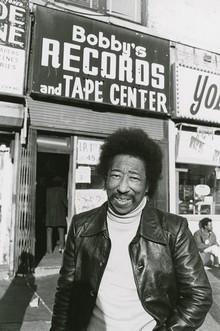
Morgan Clyde "Bobby" Robinson was an American independent record producer and songwriter in New York City, most active from the 1950s through the mid-1980s.

This is a discography chronicling the musical career of James Brown. Brown joined Bobby Byrd's vocal group The Flames in 1953, first as a drummer, and then as leading front man. Later becoming The Famous Flames, they signed with Federal Records in 1956 and recorded their first hit single, "Please, Please, Please", which sold over a million copies.
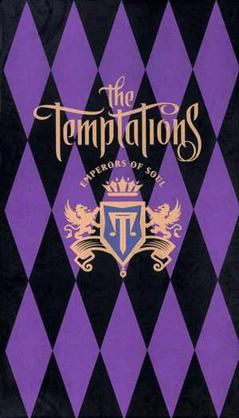
Emperors of Soul is a 1994 box set compilation for The Temptations, released by Motown Records. The five-disc collection covers the Temptations' entire four-decade history, from the first recording of The Distants in 1959 to four new recordings by the then-current Temptations lineup of Ali-Ollie Woodson, Theo Peoples, Ron Tyson, and stalwart members Otis Williams and Melvin Franklin.
Jimmy Ray Johnson was an American session guitarist and record producer.
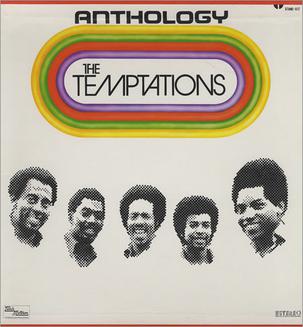
Anthology: The Temptations is one of three greatest hits collections released by Motown Records covering the work of soul/R&B group The Temptations. The initial release was a vinyl three-LP set issued on August 23, 1973, which covered the group's work up to that point. A compact disc double album version was issued in 1986, including five additional tracks recorded between 1973 and 1984. The third and final version of Anthology, also a 2-CD release, was issued on May 23, 1995, with a further re-tooled track listing. In 2003, the album was ranked number 398 on Rolling Stone magazine's list of the 500 greatest albums of all time; the list's 2012 edition had it ranked 400th, while on the 2020 edition it was ranked at number 371.

The Famous Flames were an American rhythm and blues, soul vocal group founded in Toccoa, Georgia, in 1953 by Bobby Byrd. James Brown first began his career as a member of the Famous Flames, emerging as the lead singer by the time of their first appearance in a professional recording, "Please, Please, Please", in 1956.

The Singles, Volume II: 1960–1963 is the second compilation in a series of releases by Hip-O Select Records compiling the singles of James Brown. This compilation features all 7" single releases, including re-issues and cancelled singles. Many of the songs in this collection feature backing vocals by his singing group, The Famous Flames.

The King of Rock 'n' Roll: The Complete 50's Masters is a five-disc box set compilation of the complete known studio master recordings by American singer and musician Elvis Presley during the decade of the 1950s. Issued in 1992 by RCA Records, catalog number 66050-2, it was soon followed by similar box sets covering Presley's musical output in the 1960s and 1970s. This set's initial long-box release included a set of collectible stamps duplicating the record jackets from every Presley LP on RCA Victor, every single that had a picture sleeve, and most of his EP releases. The set includes a booklet with an extensive session list and discography, and a lengthy essay by Peter Guralnick. It peaked at #159 on the album chart and was certified a gold record on August 7, 1992, by the RIAA. Further certifications were for platinum on November 20, 1992, and for double platinum on July 30, 2002.
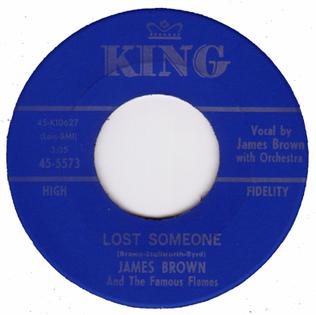
"Lost Someone" is a song recorded by James Brown in 1961. It was written by Brown and Famous Flames members Bobby Byrd and Baby Lloyd Stallworth. Like "Please, Please, Please" before it, the song's lyrics combine a lament for lost love with a plea for forgiveness. The single was a #2 R&B hit and reached #48 on the pop chart. According to Brown, "Lost Someone" is based on the chord changes of the Conway Twitty song "It's Only Make Believe". Although Brown's vocal group, The Famous Flames did not actually sing on this tune, two of them, Bobby Byrd, and "Baby Lloyd " Stallworth, co-wrote it with Brown, and Byrd plays organ on the record, making it, in effect, a James Brown/Famous Flames recording.

Love, Power, Peace: Live at the Olympia, Paris, 1971 is a live album by James Brown. It is the only recording that documents one of his live performances with the original J.B.'s lineup featuring Bootsy and Catfish Collins. Love, Power, Peace was originally intended for a 1972 release as a vinyl triple album, but was cancelled after the key members of the original J.B.'s left Brown to join Parliament-Funkadelic. The album was finally released for the first time in 1992, edited down for a single compact disc; the full show, using Brown's original mixdown was later released in July 2014 on Sundazed Records.
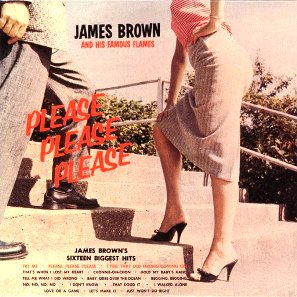
Please Please Please is the debut studio album by the Famous Flames under the billing "James Brown and His Famous Flames", featuring the first album of recordings during Brown's long career. It includes the group's first two hit singles, the title track and "Try Me", along with all the non-charting singles and b-sides he had recorded up to the time of the album's release. The album was reissued in 2003 by Polydor on a Japanese 24-bit remastered import CD packaged in a miniature LP sleeve.
"Oh Baby Don't You Weep" is a song recorded in 1964 by James Brown and The Famous Flames. Based upon the spiritual "Mary Don't You Weep", it was recorded as an extended-length track and released as the first two-part single of Brown's recording career. It peaked at #23 on the Billboard Hot 100 and at #4 on the Cash Box R&B Chart.. It was the last original song featuring the Famous Flames to chart, not counting the 1964 re-release of "Please, Please, Please" and the 1966 B-side release of the Live at the Apollo performance of "I'll Go Crazy".

Pure Dynamite! Live At The Royal is a 1964 live album by James Brown and The Famous Flames. Originally issued on King Records, it was the live follow-up to Brown's 1963 Live at the Apollo LP, and like that album, reached the Top 10 of the Billboard Pop album charts, peaking at #10. It was recorded live at the Royal Theatre in Baltimore, Maryland, a popular venue for R&B artists of the day. The album takes its title from Brown's most famous nickname at the time, "Mr. Dynamite".

A Man and His Soul is a 1967 compilation of studio and live performances by Ray Charles. The LP version includes an album size booklet containing biographical information, photos, and details on his recordings.

The History of The Dave Clark Five is a compilation album by the English rock band the Dave Clark Five, released in 1993 by Hollywood Records. Released at the same time as its UK counterpart Glad All Over Again, it features a different track listing. It spent a week on the Billboard 200 charts in August 1993 at No. 127. With the exception of "You Must Have Been a Beautiful Baby", all of the DC5's Top 40 hits are featured, as well as classic album tracks, non-LP tracks and UK-only releases.

The Singles, Volume I: The Federal Years: 1956–1960 is the first compilation in a series of releases by Hip-O Select Records compiling the singles of James Brown. This compilation features all 7" single releases, including re-issues and canceled singles. Most of the songs in this collection feature backing vocals by Brown's vocal group, The Famous Flames.
Classic Rock was a 31-volume series issued by Time Life during the late 1980s and early 1990s. The series spotlighted popular music played on Top 40 radio stations of the mid-to-late-1960s.














